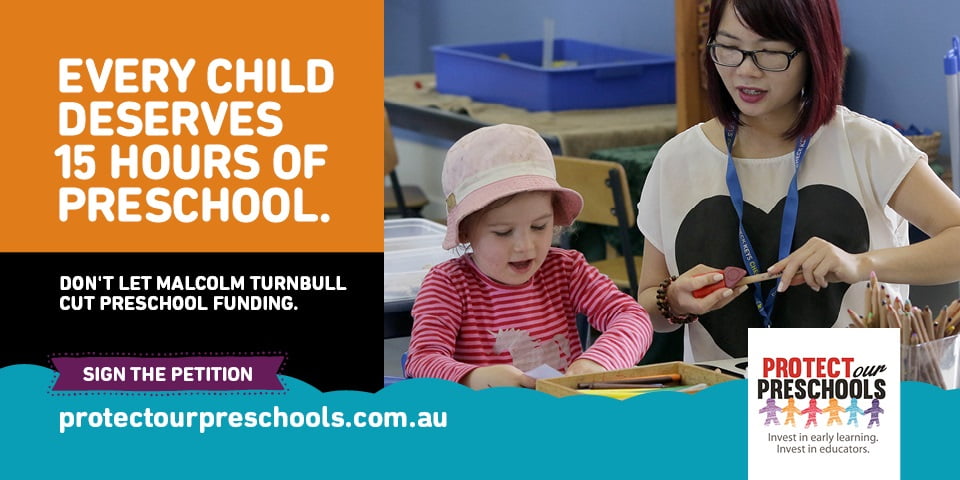Australia’s preschools have commenced 2017 with no certainty over their federal government funding beyond this year. This leaves thousands of parents and educators in limbo and puts at risk the 15-hours of quality preschool currently available to all four-year-olds in Australia.
The Federal Government has repeatedly failed to make preschool funding permanent, despite the overwhelming evidence that universal preschool provides a long-term boost to student performance and pays back its cost to the taxpayer many times over.
There was nothing in the 2016/17 Budget to fund preschool after this year and Education Minister Simon Birmingham still has not committed to the 15 hours of quality preschool our children need.
Without secure funding, the fear is that cash-poor states and territories will drop back to the 10 or 12 hours’ provision they offered before they and then-education minister Julia Gillard signed the National Partnership Agreement on Early Childhood Education and Care.
Children in 2018 could lose up to a third of their preschool time, and thousands of educators could lose work.
That would be a terrible outcome, and set back their education, given the strong benefits quality preschool delivers to children, in particular those at risk.
While right-wing politicians such as Senator David Leyonhjelm deride early childhood education and care as “wiping noses and stopping the kids from killing each other” serious researchers understand the value of starting education early
One Australian child in five is not ready and able to learn when they begin primary school. While early intervention can often help these students once they start school, having them attend preschool makes a huge difference to their development.
The Australian Early Development Census assesses children about six months into their primary schooling against five domains: physical health and wellbeing; social competence; emotional maturity; language and cognitive skills; and communication skills and general knowledge.
For children who receive at least one year of preschool, the risk of registering as developmentally vulnerable falls by at least a quarter.
The centre’s research shows that for preschool to have a sustained effect, children need at least 15 hours a week for at least a year, preferably two.
Losing that 15 hours will means more children arriving at school without the skills needed to start learning.
Losing the 15 hours will also cause a major disruption to the sector, and create uncertainty around jobs for educators.
Ramping up to 15 hours required a major reorganisation and investment by centres, some of which would have to be dismantled.Early childhood education is already struggling to retain staff, and the uncertainty will make retention harder.
Preschools need certainty about their future as soon as possible, and funding to make 15 hours of quality preschool, delivered by a university-trained teacher needs to be made permanent.
Minister Birmingham has repeatedly endorsed the value of preschool, even suggesting the program could be extended to three-year-olds. He needs to convince his cabinet colleagues to back this vital investment in our kids.
The AEU has written to all state and territory leaders seeking their support in placing pressure on the federal government. We were encouraged by the reply we received from NT Chief Minister Gunner, which stated that “the Northern Territory will continue to work closely with the Australian Government and other jurisdictions for a long-term funding solution for early childhood education and care”.
The AEU has launched a campaign entitled Protect our Preschools to secure permanent funding. Please take a moment to visit the site and sign the petition. If you’re on Facebook you can also like the page and share it among colleagues, friends and family.
* This article has been adapted from a piece originally published on our federal website on 19 January.

